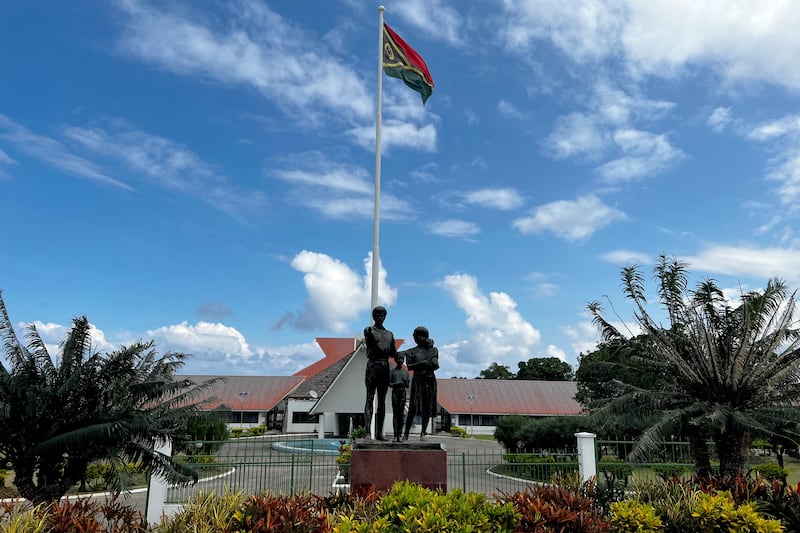As a proud naturalized citizen of Vanuatu, I am fond of my green passport with the country’s flag emblazoned on its corner.
An added benefit is that it offers visa-free access to the 27 countries that make up Europe’s Schengen area. The Solomon Islands is the only other Pacific island nation with the same right.
But it seems increasingly likely that this will not be the case come August.
Last week, the European Commission proposed permanently withdrawing the visa waiver for citizens of Vanuatu after an earlier suspension. The problem is that Vanuatu’s lucrative Citizenship by Investment (CBI) programs throw up too many red flags for European Union officials to ignore.
Under the programs, Vanuatu grants citizenship to foreigners in exchange for investment, but there has long been concerns about misuse for financial crime, such as tax evasion or money laundering.
Last year it was revealed that high-profile alleged fraudsters and money launderers Ajay and Rajesh Gupta have Vanuatu citizenship. The fact that they were under investigation in South Africa was declared on their application. But the Vanuatu Citizenship Commission determined that this did not prevent them from qualifying as they were considered innocent until proven guilty.
The European Commission has said it has engaged intensively with the government of Vanuatu to resolve the security risks associated with its investor migration schemes.
The Vanuatu government has gone some way to meet European concerns, including by enacting legislation. But overall, the levels of risk associated with Vanuatu’s CBI schemes are considered too high to bear.

Suspension of the visa waiver is not something the EU takes lightly. Only three countries have had the privilege suspended, either temporarily or permanently: Belarus, Russia and Vanuatu. This is not the sort of exclusive club to which anyone wants to belong.
The commission’s proposal needs to be accepted by both the European Parliament and the European Council to take effect. Previous recommendations on visa issues have not been challenged at higher levels, so it seems likely that this one will be accepted as well.
The CBI schemes have been a live issue for some time. While other Pacific countries, such as Tonga, have been struggling with debt distress, Vanuatu has long been caught in a revenue trap. Many observers have warned that a failure to address the EU’s concerns could put paid to a highly lucrative revenue stream.
Sources close to the Vanuatu government have told me that the announcement from the European Commission does not come as a surprise “given Vanuatu’s shambolic handling of the whole citizenship thing.”
In the short term the people who will be most affected by this are the athletes and para-athletes who will represent Vanuatu in the upcoming Olympics in Paris. Beyond that, this decision will have pronounced effects on Vanuatu’s economy and international reputation.
The significance of CBI as a revenue stream increased markedly in 2015 with the introduction of programs aimed at supporting the economy after the devastating impacts of Tropical Cyclone Pam.
The contribution to the public purse from these schemes rose to more than U.S. $120 million in 2020. This constituted 42% of government revenue.

Fast forward to 2022, when the EU visa-waiver was partially suspended, and the impact was stark. In the first half of that year, the government collected $40.29 million, which was less than 50% of the amount that was budgeted.
The decline continued in 2023. The government received $37.46 million between January and June last year, amounting to 48.9% of the amount that was budgeted. It seems the golden goose is cooked.
While many have criticized Vanuatu’s use of CBI as a revenue source, it is important to look at how that money has been used.
Thanks to careful work on the part of the Ministry of Finance, the income has been largely protected from political cash splashing and provided successive governments with additional policy space.
During the COVID-19 pandemic, with borders closed and tourism at a standstill, the government was able to fund business support packages. In addition, the boom years of CBI revenue between 2015-20 created sufficient financial buffers that meant even with the impacts of the pandemic and Tropical Cyclone Harold in 2020, the country was able to service debt comfortably.
But if the demand for citizenship continues to decline, as seems likely, there will be a large shortfall in revenue collection. This will put pressure on governments that struggle to provide even a basic level of services to a growing, dispersed population.
Tess Newton Cain is an associate professor and project lead for the Pacific Hub at Griffith Asia Institute, Griffith University. She has worked as an independent consultant and researcher in the South Pacific for more than 25 years. The views expressed here are her own and do not reflect the position of BenarNews.
